Rebel Power : Why National Movements Compete, Fight, and Win
從阿爾及利亞到愛爾蘭再到美國,世界上許多州都是強大的民族運動實現獨立的結果。許多其他民族運動,包括巴斯克人、庫爾德人和巴勒斯坦人,都未能成功地實現建國。在《叛軍力量》中,彼得·克勞斯(Peter Krause)提供了強有力的新理論來解釋這種差異,著眼於民族主義團體之間的內部力量平衡,這些民族主義者相互合作以建立一個新國家,同時競爭領導一個新國家。最有權勢的集團會在統治自己的狀態下推動建立國家,而較弱勢的集團不太可能獲得任職的地位還可能會成為破壞者,他們會冒險的利用不斷升級的暴力來阻止勝利,同時提高他們在運動體系中的地位。因此,與一個內部競爭的,支離破碎的運動相比,具有一個統治集團的霸權運動更有可能取得國家地位,這是因為它們更加追求勝利,並且較少使用適得其反的暴力。
克勞斯(Krause)在中東、北非和歐洲政府和民族主義團體檔案館中進行了多年的實地考察,並對巴勒斯坦、猶太復國主義者、阿爾及利亞和愛爾蘭民族運動的參與者進行了150多次採訪。這項研究對這四個民族運動進行了縱向比較分析,這些運動涉及140個奮鬥時期的44個運動中的40個團體。克勞斯(Krause)指出了這些運動歷史上的新轉折點,並為其使用暴力和非暴力策略以及其成敗提供了新的解釋。反叛力量不僅對於了解民族運動的歷史,而且對於理解當今有爭議的集體行動的起因和後果,從阿拉伯之春到敘利亞、阿富汗、伊拉克及其他地區的內戰和叛亂,都是必不可少的讀物。
Many of the world's states―from Algeria to Ireland to the United States―are the result of robust national movements that achieved independence. Many other national movements have failed in their attempts to achieve statehood, including the Basques, the Kurds, and the Palestinians. In Rebel Power, Peter Krause offers a powerful new theory to explain this variation focusing on the internal balance of power among nationalist groups, who cooperate with each other to establish a new state while simultaneously competing to lead it. The most powerful groups push to achieve states while they are in position to rule them, whereas weaker groups unlikely to gain the spoils of office are likely to become spoilers, employing risky, escalatory violence to forestall victory while they improve their position in the movement hierarchy. Hegemonic movements with one dominant group are therefore more likely to achieve statehood than internally competitive, fragmented movements due to their greater pursuit of victory and lesser use of counterproductive violence.
Krause conducted years of fieldwork in government and nationalist group archives in the Middle East, North Africa, and Europe, as well as more than 150 interviews with participants in the Palestinian, Zionist, Algerian, and Irish national movements. This research generated comparative longitudinal analyses of these four national movements involving 40 groups in 44 campaigns over a combined 140 years of struggle. Krause identifies new turning points in the history of these movements and provides fresh explanations for their use of violent and nonviolent strategies, as well as their numerous successes and failures. Rebel Power is essential reading for understanding not only the history of national movements but also the causes and consequences of contentious collective action today, from the Arab Spring to the civil wars and insurgencies in Syria, Afghanistan, Iraq, and beyond.
Peter Krause (Auther)
Publisher:Cornell University Press




 留言列表
留言列表


 {{ article.title }}
{{ article.title }}